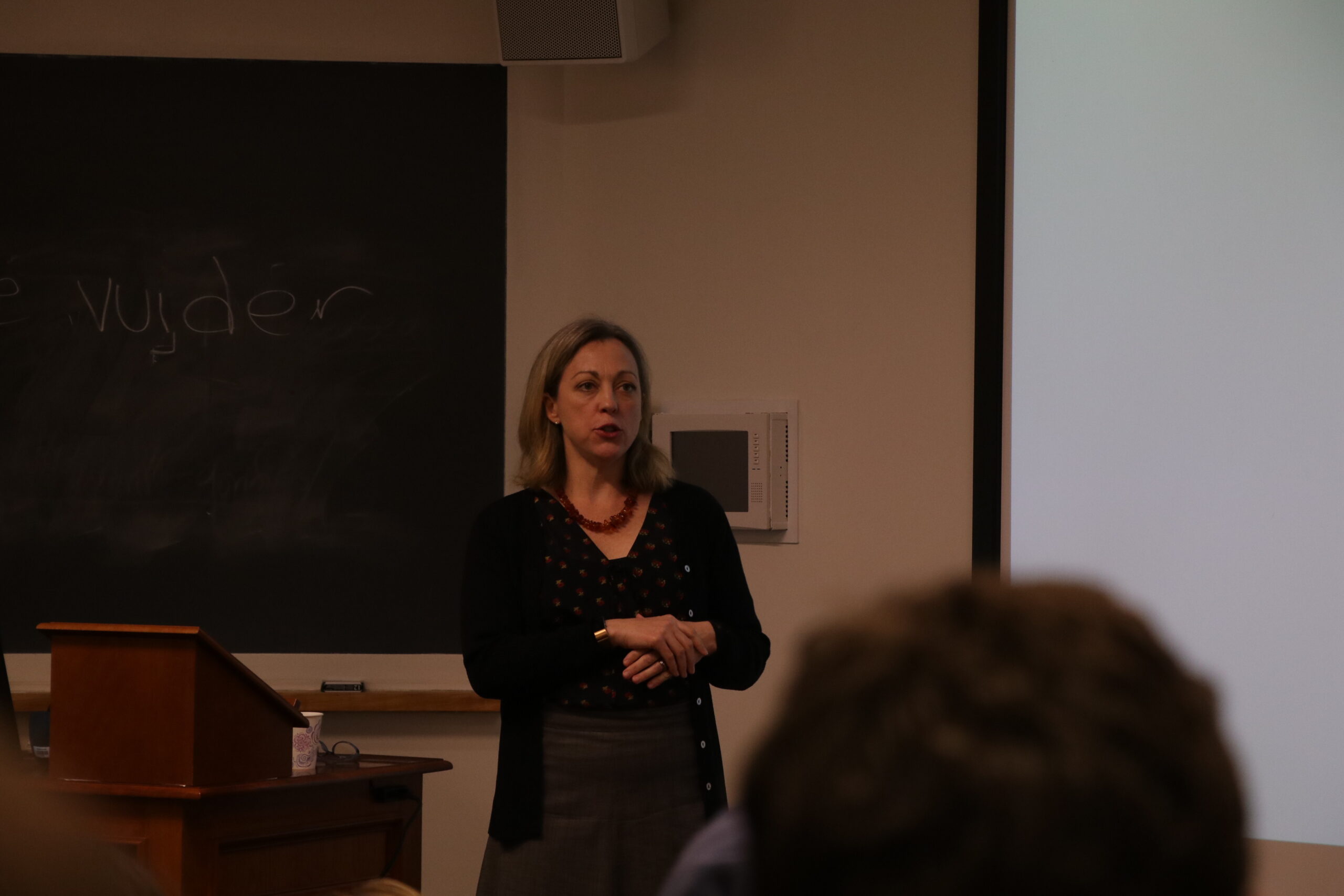Lecturer analyzes premodern reproductive health
February 8, 2019
On Monday afternoon, Leslie Tuttle, associate professor of history from Louisiana State University, began a talk to a packed audience in the Beam Classroom by describing the “suspicious death” of Mademoiselle de Guerchy, a tabloid star of Louis XIV’s Paris. As Tuttle revealed, de Guerchy died due to complications from an abortion procedure. The registered midwife in whose home de Guerchy was found dead was charged with the death of de Guerchy and of the unborn child, and she was sentenced to death.
But the tragedy with which Tuttle opened her talk, titled “Exploring Hidden Networks of Abortion in Early Modern Paris,” is not really the point. Rather, Tuttle used the example of Mademoiselle de Guerchy to spark questions about the widely-accepted notion that women’s rights in Western civilization have always progressed toward greater individual freedom, culminating in widespread liberation movements of the 1960s and 70s.
 Emily Fuller
Emily FullerWith humor and occasionally gruesome detail, Tuttle illustrated the robust networks of abortion providers and clients in 17th-century Paris, where the practice was neither uncommon nor rigorously prosecuted. Beginning her talk with de Guerchy’s case, she admitted, was demonstrative of the exact idea she would attempt to challenge.
“Retelling the story of Mademoiselle de Guerchy—as I myself have done, as I just did again in front of all of you—can unwittingly support the misleading narrative that I am going to now deconstruct,” Tuttle said. “The dramatic, well-documented case in which every female participant ends up dead may make a compelling story, but it is utterly unrepresentative of the norm.”
Associate Professor of History Meghan Roberts invited Tuttle to Bowdoin after hearing her talk at a conference. The event, sponsored by the history department, the Sexuality, Women and Gender Center and the Gender, Sexuality and Women’s Studies Program, augmented the content of the courses Roberts is teaching this semester: History of the Body and Old Regime and Revolutionary France.
“We’re constantly bringing in present day issues and thinking about how studying the past helps us understand the present in a much more complex and nuanced way,” said Roberts of her courses.
To Tuttle, abortion in early modern France may be considered a “twilight moment,” a term coined by historian of sexuality Anna Clark that describes activities that people are reluctant to openly discuss and document, but also do not result in complete stigmatization. In her research Tuttle found discussion of abortion procedures in archival materials ranging from police reports to royal pharmacopeia that included recipes for potions to induce contractions.
“Don’t try this at home,” joked Tuttle.
Most abortion procedures at the time, however, were not medieval in nature. In fact, explained Tuttle, providers of abortion procedures viewed their practice as a sort of clandestine business, in which they sought to demonstrate more expertise than their “competitors” and develop a reputation of providing effective and safe care for their clients.
In terms of regulation, Tuttle argued that neither the Catholic Church nor the state was unequivocal. Confessor’s manuals at the time suggested that, until at least the 18th century, inducing abortion before the subjectively-defined moment when the fetus acquires a soul was considered a sin analogous to lying by concealing sexual immorality, rather than murder. Though the practice may eventually have been elevated in seriousness, abortion completed in early-modern Paris was occasionally a way to, as one midwife put it, restore a woman’s honor and salvation.
To Zach Scharlau ’21, a student in Roberts’ Old Regime and Revolutionary France class, this part of Tuttle’s argument was unexpected.
“I figured that, given how religious old society was, that abortion would have been more criminalized than it had been,” he said. “Even the Catholic Church didn’t have as extreme a stance on abortion as I thought they would have had, so that was the most surprising part to me.”
Royal law similarly left abortion in a gray area. Despite the existence of a 16th-century “ostensibly draconian” edict against clandestine pregnancy, the justice system appeared “extremely ill-equipped” to prosecute cases of abortion, said Tuttle.
“It was when things went catastrophically wrong that we see them, for the most part, at all,” she said.
Throughout her talk, Tuttle suggested that the mainstream narrative of women’s history is misleading. European nation-states in the 18th century, she noted, codified the illegality of abortion in a way that early modern Paris did not.
Tuttle left the audience to ponder the question: “How would our understanding of abortion look different if we made modern state criminalization, rather than decriminalization in the 1960s and 70s, the historical turning point of history?”
Tuttle said she doesn’t have an answer, but for Roberts, the important part was that the legal history of abortion, a controversial topic in modern political conversations, not be oversimplified.
“There are these default, easy historical narratives about the past that get brought into our political debate all the time, but they’re not actually accurate,” said Roberts. “So how does the conversation shift if we embrace living in shades of grey, which is what I really want my students to do.”

Comments
Before submitting a comment, please review our comment policy. Some key points from the policy: